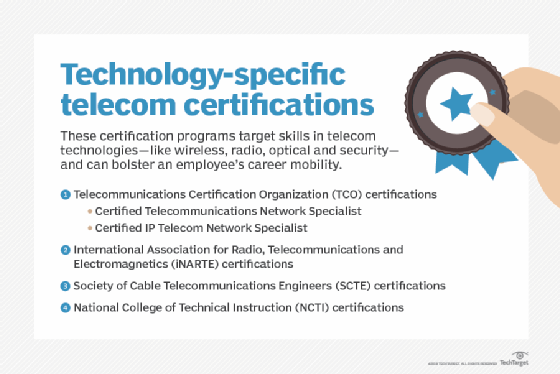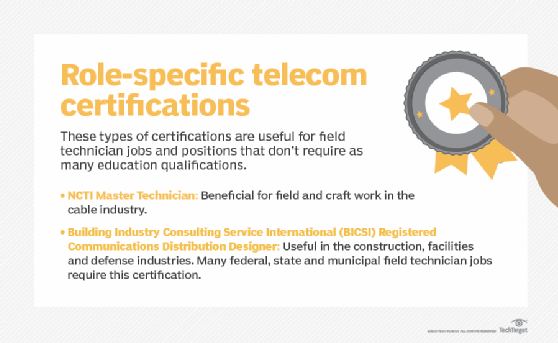
ThorstenSchmitt - Fotolia
Learn about the top telecom certifications
Use this expert advice to wade through myriad telecom certifications and pinpoint the top certifications for the industry, like TCO, iNARTE and BICSI certifications.
It often seems anyone these days can claim to be anything, and it can be difficult to know whether a claim of experience in a given product or technology is accurate. Certification programs are a growing factor in the telecom industry, but like anything popular, they're multiplying. Here, we discuss the top networking certifications for the telecom space and why they're beneficial.
One reason why certification programs can be confusing is because three distinct classifications actually exist for certifications. These include vendor-specific certifications, technology-specific certifications and role-specific certifications. The value of each depends on a number of factors, including the breadth of responsibility for a given position, the extent to which the infrastructure is multivendor and the size of the organization involved.
Vendor-specific certifications
Vendor-specific certifications are rated as the most valuable type of certification, but their value depends on how much of the vendor's equipment the certification candidate uses. Cisco certifications rate among the top telecom certifications, but Cisco has expanded its number of certifications significantly. It offers Entry, Associate, Professional, Expert and Architect certification levels, with two to nearly a dozen specializations per level. Other vendor programs are similar.
Vendor certifications are often time-consuming, requiring prequalification in terms of experience, online or classroom training, and exams. Certifications will generally require renewal every three years. The costs vary significantly depending on the specific certification and even the area where the exams are given. For skill building on the job, though, vendor-specific certifications are difficult to beat for value.
Technology-specific certifications
Technology-specific certification programs are generally aimed at classes of devices, including wireless, radio, optical and security. In some cases, the entry-level grade of vendor certification will provide a similar skill level as technology certifications, but vendor programs tend to be specific to the vendor and are less recognized where that vendor isn't dominant.
The Telecommunications Certification Organization (TCO), the International Association for Radio, Telecommunications and Electromagnetics (iNARTE) and the Society of Cable Telecommunications Engineers (SCTE) offer technology specialist certifications at multiple skill levels in multiple technology choices. TCO and iNARTE certifications are generally more useful, and both are more highly regarded as the certification skill level rises. SCTE and NCTI are widely recognized in the cable industry, but less so for telecom overall.
The TCO certification programs are administered by Teracom Training Institute, with a specific sequence of courses and prerequisites for certification. The TCO Certified Telecommunications Network Specialist and Certified IP Telecom Network Specialist categories are particularly valuable for software engineers who want to work in the telecom space, as a basic certification, but some operators prefer vendor-specific basics or second-level certifications.
The iNARTE program requires the candidate to have more work experience and to study a year in-grade at the previous level before taking an advanced certification program. An iNARTE certification seems somewhat more valuable in the market.
The best use of technology certification programs is for entry-level qualification, or to advance in a specialty already chosen. These programs are highly rated among service providers, beating out all vendor programs but Cisco's, and perhaps those of Ericsson and Nokia in wireless. For many operators, these programs are the equivalent of an advanced degree, particularly those at the higher levels. As such, it's probably wise to view basic certifications as a step toward the higher levels, rather than as an end in themselves.

Role-specific certifications
Role-specific certification is the most general category, but some role requirements are filled by the other certifications. Thus, the focus of this certification group is primarily on jobs as a field technician. The same organizations that offer technology-specific certification offer role-based technician or specialist certifications designed to let engineers demonstrate skills at a given job type.
The NCTI Master Technician certification provides critical role-based certification in the cable industry and is essential for field and craft work. In many ways, it is sufficient as proof of qualification, even for those with little work experience.
Likewise, the Building Industry Consulting Service International (BICSI) Registered Communications Distribution Designer provides certification for the facilities and defense industries. The BICSI certification is required for many federal, state and municipal field technician jobs. Many construction engineering firms looking for network specialists for wired and smart buildings require this certification.
These top certifications related to field technical jobs are good bets for non-degree positions and candidates. Both certifications are a good value for the space, but they demonstrate how more role-based certifications are targeting field technicians or craft personnel. As such, engineer positions with higher values require better education qualifications, technology specialization or vendor certifications.

The necessity of telecom certifications
The number of certifications and represented specializations is growing. As telecom employment becomes more specialized and employers seek validation of employee skills, engineering graduates need to provide specific proof of skills, which drives certification growth. Telecom organizations say they are more likely to seek candidates with very specific skills for entry-level jobs and look for broader skill sets for senior personnel.
For entry certification, it's recommended you have either a degree or some direct job experience. This generally isn't a requirement for certification programs, but it may be difficult to pass exams and compete for jobs without this foundation. Most employers require this level of foundational education or experience, whether it includes certification or not. You will almost certainly have to complete lower levels of certification before advancing to higher-level certification in the same specialties.
The obvious question is whether certification is really necessary, or even useful, in today's networking industry. The answer is complicated, but, generally, yes. Entry-level certification that is relevant to the job at hand is definitely useful for both the employee and the employer. Higher-level role or technology certification is helpful for career mobility. Vendor certification -- particularly the two highest levels of the vendor or technology programs -- can be a critical asset for anyone, as they're like the MBA of certification.






